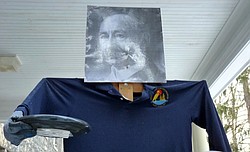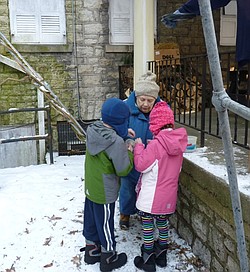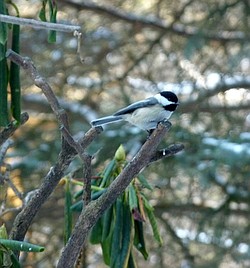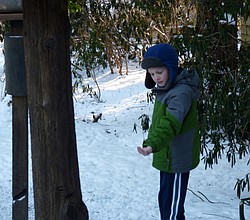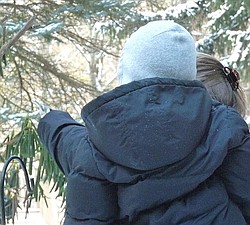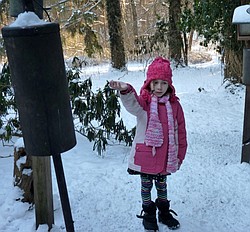Participants feed birds
Neighbors | Elise McKeown Skolnick.A scarecrow form was used to make a feeder that looks like person. It's meant to get birds used to eating out of people's hands.
Neighbors | Elise McKeown Skolnick.Ohio certified volunteer naturalist Nancy Brundage gave birdseed to participants in a Ford Nature Center program. They tried feeding birds from their hands.
Neighbors | Elise McKeown Skolnick.Black-capped chickadees can often be coaxed to eat from a person's hand. A group of people gave it a try at a Ford Nature Center program Jan. 4.
Neighbors | Elise McKeown Skolnick.Holden Reed was ready for a bird to eat from his hand. He participated in the Bird in Hand program at Ford Nature Center Jan. 4.
Neighbors | Elise McKeown Skolnick.A black-capped chickadee ate from Stephanie Abu Quaduorah's hand while her son, Adam, 3, watched.
Neighbors | Elise McKeown Skolnick.Carmen Reed waited patiently for a bird to land on her hand at a Ford Nature Center program Jan. 4.
By ELISE McKEOWN SKOLNICK
The temperature was frigid – below zero with the wind chill – but quite a few people were still game to try feeding wild birds from their hands Jan. 4.
Ohio certified volunteer naturalist Nancy Brundage led the annual “Bird in Hand” program at Ford Nature Center in Mill Creek MetroParks. Brundage showed the group pictures of birds frequently seen in the park, including cardinals, blue jays and nuthatches.
“The one that will usually come to your hand is the black-capped chickadee,” Brundage said.
Participants cupped birdseed in their hands and stood still, waiting for birds to land.
“Stand like a statue,” Brundage told them.
To prepare for the program, Ford Nature Center workers emptied the feeders outside the building the night before the event. They also created a permanent “person” to feed the birds. Using a scarecrow form, a Frisbee for a hand and a photo of the founder of Mill Creek Park – Volney Rogers – they formed a birdfeeder that looks like a person.
“The idea is to get them used to coming to something that looks like us,” said Ray Novotny, MetroParks outdoor education manager.
Despite the cold temperatures, most participants took off gloves and held the birdseed in their bare hands. This allowed them to have a better chance of a bird landing on their hand and eating the offered seed. Eventually, many donned gloves again, however.
A black-capped chickadee landed on Stephanie Abu Qaduorah’s hand, and enjoyed some seed. The bird was very light, she said.
 43
43

